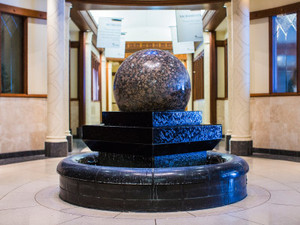 "
"
In order to analyze how to best serve students on campus, Campus Ministry is participating in the very activity that defines students as a group. Campus Ministry is taking a step back, so it can study.
Within the same month that Rev. Peter McCormick, C.S.C, or Fr. Pete as many know him on campus, took over as Director of Campus Ministry, the office began a comprehensive, semester-long study called the Spirituality Study to explore how Campus Ministry could better meet the needs of Notre Dame students today.
McCormick had previously served as Keough Hall’s rector from 2007-2013. In 2014, he was named Associate Director of Campus Ministry and spent the fall semester learning and training to take over the director position this spring. He is also currently studying for his executive MBA from the Mendoza College of Business and serves as the chaplain for the men’s basketball team.
Before coming into the director role on Feb. 1, McCormick and the Campus Ministry staff had already begun to plan for a comprehensive study, the idea for which arose out of the strategic plan they were developing. Campus Ministry creates a new strategic plan, outlining its mission and goals, every three to five years.
In creating this new strategic plan, McCormick started from scratch.
“There certainly have been previous strategic plans, but we basically scrapped it all and said, what are we going to do? Who are we now, in 2014 and beyond?” McCormick says.
Student Leadership
McCormick says that his predecessor, Rev. Jim King, C.S.C. began a shift in Campus Ministry toward student leadership and ownership of programming. Under King, Campus Ministry began giving more responsibility to students to take charge of both the logistics and content of retreats, details that previously were handled by Campus Ministry staff. McCormick says he practiced a similar model as rector of Keough Hall, trusting his assistant rectors and resident assistants to take ownership of running the hall.
“I so deeply believe in the student development model,” he says. “The best thing I can do for any student is to trust them, to give them the knowledge they need and the space to make mistakes.”
This year also marked the beginning of the Anchor Leadership Program, the goal of which is to “prepare [students] to serve the Church under the Dome and beyond, equipping [students] with knowledge, experience and guided growth in their faith.” The Anchor Leadership Program is meant to guide students through faith leadership during their time at Notre Dame from freshman year to senior year, culminating in the Anchor Internship.
Formerly, Campus Ministry employed four full-time post-grad interns each year. This year, those internships were replaced with the Anchor Internships, filled by nine current seniors who work part-time in Campus Ministry.
“The point of the program is to help build student leaders and help students who are able to share their faith and lead others in that journey,” senior Jordan Russell, a member of the first class of Anchor interns, says. “I think in some sense, the program is helping form us as leaders, helping us to be able to form other students as leaders and I think also having senior interns breaks down a little bit of a barrier in terms of relatability.”
With these recent implementations in mind, McCormick felt that with the next strategic plan, he needed to start over in order to reflect the cultural change begun by King, an emerging focus on student leadership and the student perspective.
Strategic Plan
McCormick’s working strategic plan for 2015-2018, entitled “Educating Hearts and Minds,” is broken into three sections. The first is evangelization or “how campus ministry invites, welcomes and encourages people to give faith some real consideration in their lives,” according to McCormick. The second is formation, giving students the information they need to deepen their faith, and the third is a deeper sense of prayer.
“The real hope is that we’re giving people an opportunity to learn a bit more, we’re deepening that knowledge and then hopefully it’s being led into a form of prayer,” McCormick says.
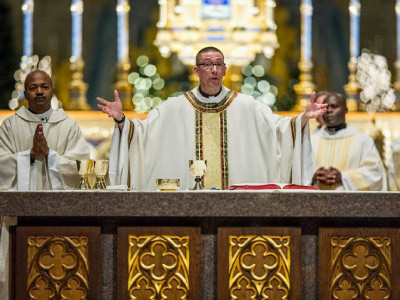
Each section of the strategic plan contains more specific goals, such as to “support students in their capacity to cultivate community at Notre Dame and beyond” or to “establish programming that promotes communities rooted in support and accountability.”
When McCormick began thinking about the ways to reach the goals in the strategic plan, he and his colleagues saw the potential for an opportunity.
“As we began to work on the strategic plan, there were a lot of insights that were gleaned about new directions to move in and ways to consider who we are as Campus Ministry, and it became clear to me that we can’t sit in some office space and say this is going to be right on the money for students,” McCormick says. “We should probably go out and ask.”
Spirituality Study
Along with other leaders in Campus Ministry, McCormick decided to begin a study that would figure out who the Notre Dame student is and how Campus Ministry can best serve him or her. The ultimate goal of the study would be to fill in more specifically the action points in the Strategic Plan, without making any assumptions based on what has worked in the past or the needs of students.
The study focuses primarily on Retreats, Pilgrimages and Spirituality, one aspect of Campus Ministry led by Assistant Director John Paul Lichon.
“For Campus Ministry, the default mode of programming is to start something and then just keep running it forever. The Freshman Retreat started about 15 years ago and certainly when that started, freshmen were a lot different than they are today,” Lichon says. “I don’t want to give the impression the retreat never evolved because it certainly did but even basic things like that the Freshman Retreat is 24 hours long and that it is held across the lakes at the Sacred Heart Parish Center have stayed the same. But now, are freshman even capable of giving 24 hours?”
Through the study, McCormick and Lichon hope every question can be placed on the table and every opportunity explored.
“We’re giving ourselves permission to let go of some things that were started so long ago, just to get ourselves out of that mindset of doing what we did last year. We’re thinking about how what we do syncs up with where students are,” Lichon says.
Last October, McCormick announced officially that, beginning in the spring, Campus Ministry would be embarking on a Spirituality Study aimed at “exploring the emerging spiritual needs of students.”
In order to free time for both the new Anchor interns and Campus Ministry staff to work on the Spirituality Study, Campus Ministry cancelled both Freshman Retreats for the spring, a sizable sacrifice given that around 100 freshman typically attend the retreats and that these retreats often serve as a first encounter with Campus Ministry.
“We thought, let’s take a hard look and think about if this is the best way we should be doing things,” Lichon says. “And the best way we thought we could do that was to kind of hit pause a little bit … We did cancel the freshman retreats to give ourselves some space to do this for a semester. Let’s give ourselves a little bit of time to ask ourselves these questions and think about the questions and to do that we need to keep things minimal programming-wise for now.”
In his Oct. 15 Letter to the Editor published in “The Observer,” McCormick offered freshmen other opportunities to get involved in Campus Ministry and encouraged them to sign up for the fall Freshman Retreat that had not yet occurred.
“I think one of the areas that Notre Dame sometimes promotes is a real strong sense of tradition, and we have that in Campus Ministry as well. What I also want us to be able to do is a certain embracing of the future,” McCormick says.
Staying in line with Campus Ministry’s new emphasis on student leadership, McCormick and Lichon brought on five seniors to effectively lead the Study through five different committees. The five seniors, four of whom are Anchor interns, would each take charge of one aspect of the study and lead a team of their own.
“One of the best parts in my mind is really empowering students to shape what Campus Ministry can be here,” Lichon says.
The Study is divided into five committees: Student Life Input, Benchmarking, Retreats and Pilgrimages, Collaboration and Spirituality.
Student Life Input
nswer the question, “Who is a Notre Dame student?”
Her 10-person committee will spend the semester having one-on-one conversations with students, beginning with friends and acquaintances, before moving on to conversations with leaders of different student organizations, as well as focus groups.
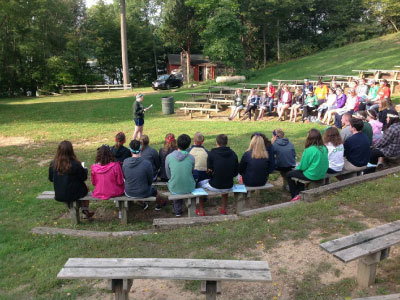
“Every conversation can have the information we’re looking for, just in hearing what your friends complain about, hearing what’s going really well in their life, what makes them excited, what jobs they’re looking for,” Russell says. “All those things are part of it. We’ve just been compiling this data from these conversations we’ve had with people trying to look for common threads, common themes that can really help us understand who students are.”
She says that some themes have begun to appear through initial conversations. One word that appears frequently is busyness.
“Obviously, everyone at Notre Dame is here for school, so we’ve started thinking about how we can integrate into academic life or dorm life,” Russell says. “I think one of the things we’re learning is that we, as students, are so over-programmed, we’re so busy, and we have so many things going on that we lose sight of building a whole person and really nurturing that.”
She says in some conversations, her committee has also noticed that Campus Ministry can carry a stigma with students.
“We’ve heard people say they aren’t involved because they don’t have their faith all together or they’re not religious,” Russell says. “We never want Campus Ministry to be that kind of place; we always want it to be a welcoming environment. We really want to be able to reach as many people as we can.”
In the coming weeks, the Student Life Input committee will begin holding focus groups on topics like campus retreats and interfaith dialogue. As they go, they will provide the other committees with their input.
Benchmarking
In addition to gleaning information from students, the Spirituality Study hopes to explore how other universities approach campus ministry. As part of that process, members of the Spirituality Study committees are travelling to several schools, including Boston College, University of Dayton, Northwestern, Loyola University Chicago and Texas A&M, in addition to talking with other campus ministries by phone and conducting research locally.
Senior Spanish and theology major Grace Carroll is leading the four-person benchmarking committee and has already planned and led trips to Boston College and Dayton. She began looking at other schools’ programs last semester and started with a list of 30 potential campuses to research, which her team then narrowed down to a handful of universities.
Both visits have provided interesting points of comparison for Carroll, who also hopes to provide useful information and recommendations to the other committees in the Study.
“It’s so easy while we’re here at Notre Dame to think how we’re doing things is the best way and the right way and that there’s no other way to do it,” Carroll says. “These visits force you to take the blinders off and reimagine how we could do some of our programming.”
Members of the Spirituality Study are visiting the other campuses as if they are prospective students. They’ll meet with campus ministry leaders, speak with students and attend relevant events. Through her first two visits, Carroll has already begun to notice some differences at other universities.
She notes that at both Dayton and Boston College, the campus ministry office houses both faith and service.
“At both schools, those two go hand-in-hand. There isn’t the dichotomy that maybe students here sometimes sense between the Center for Social Concerns and Campus Ministry,” Carroll says. “So, it’s very easy for students to transition between a week of service and then going on retreat. That transition is kind of seamless.”
Dayton and Boston College are also both Catholic universities founded on different traditions. While Boston College was founded by Jesuits, Dayton was founded by Marianists. Carroll says that students at both schools were well-versed in the charism of their school.
“At Dayton, they know the Marianist values, and they bring them up in conversation,” Carroll says. “They’re very present on campus. There are kind of mantras that just come up in conversation. The Marianist charism just permeates campus.”
Carroll noticed a similar presence of the Jesuit values at Boston College.
“That made us just question how many students at graduation could speak about the Holy Cross values,” Carroll says. “Holy Cross permeates campus. You see it just in the way our residence halls are set up with rectors and RAs and the community and family bonds that form there, but how many people would be able to name that as Holy Cross or speak to it? There’s so much there, and I think it’s kind of a travesty that students aren’t aware of it while they’re at Notre Dame.”
Boston College’s retreat program is traditionally well-attended and often has students waiting to get in. Carroll says their Kairos retreat has become a bucket list item for most students.
“At BC, they really know their students well and their retreats are designed with their students in mind. Students there really like talking about intentionality, authenticity and vulnerability, and those themes kept coming up in the retreats. Their retreats attract people from all parts of campus life. They didn’t really have a campus ministry crowd that was attending the retreats, but people from diverse backgrounds,” Carroll says.
Carroll also noticed the other schools placing heavy emphasis on student leadership.
“I think student leadership is huge. Of the schools we’ve visited and are interested in visiting, a lot of the campus ministry programming is really student-driven,” Carroll says.
After returning from a benchmarking trip, the team that attended will share their findings with the larger Spiritual Study to be used in their evaluations going forward.
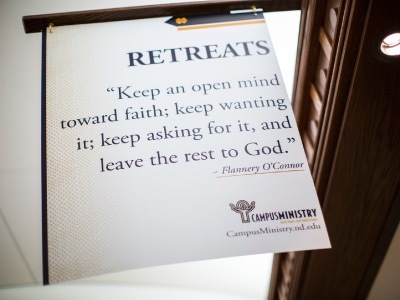
Collaboration
The Collaboration committee reflects a recognition by Campus Ministry that they are not the only source for spiritual growth and formation on campus.
The committee, led by senior sociology and political science major Reagan Li, hopes to form relationships with other organizations on campus to evaluate if Campus Ministry can work with them to better serve students.
“Our ultimate concern would be the spiritual growth of students,” Li says. “That’s the main focus of Campus Ministry, but that doesn’t have to be Campus Ministry alone, and there are maybe other groups that can do this more effectively given the specific population that they serve.”
At their first meeting, the four-person committee decided on a prioritized list of groups to reach out to. The list varied from the more obvious, like the Theology department, to some not so obvious choices, like the Career Center.
“Through our conversations with these different groups, we want to put Campus Ministry out there and say that we have tons of resources we can offer you to help you with the things you’re doing in terms of spirituality,” Li says.
Collaboration has been a piece of Campus Ministry in the past. In the fall for example, Campus Ministry partnered with the Center for Social Concerns to offer a “seminage” (seminar-pilgrimage) to Phoenix, Ariz. to learn and serve at the André House, a ministry to the homeless and poor in the area.
“I think what the Collaboration committee is doing right now is working on collaboration systematically,” Li says. “We’re talking to this whole range of different groups that we may not have talked to before in a systematic way. It’s definitely more comprehensive and more intentional.”
Li hopes that Campus Ministry can still help foster spiritual formation through less traditional avenues.
“We’re hoping that through this outsourcing that students would be able to encounter spirituality in whatever they do,” Li says.
Retreats and Pilgrimages
Senior theology major Laura Gauthier got involved as a leader in Campus Ministry through her work in student government as the Spirituality and Service chair for Sophomore Class Council. With help from Campus Ministry and Lichon, she organized a retreat from scratch for sophomores. While at Notre Dame, she says she’s attended more than 10 retreats and pilgrimages.
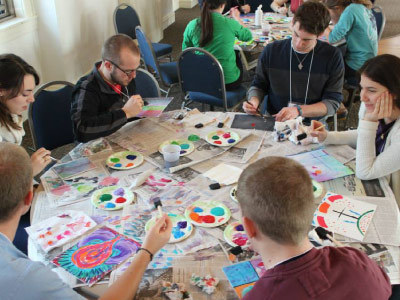
Now, she is leading a committee that has the ability to change what retreats and pilgrimages look like at Notre Dame.
The Retreats and Pilgrimages committee is tasked with evaluating current programs and using information from the Student Life Input and Benchmarking committees to examine how retreats and pilgrimages might better serve Notre Dame students.
So far, the committee has focused on student evaluations of past retreats. Retreat participants typically fill out short surveys after attending Campus Ministry retreats, which the committee is searching through for patterns and themes.
“We are finding overwhelmingly that adoration is typically one of the most important parts of the retreats that include adoration, like the Freshman Retreat or Sophomore Road Trip,” Gauthier says. “We’re also finding an overall desire for a stronger theology behind the retreats and a stronger emphasis on prayer and spirituality.”
Gauthier adds that her committee is aware that the evaluations her team is using reflect, for the most part, the opinions of retreat-goers, students who are actively seeking out retreats.
Restless Retreat was created last year as a retreat for juniors and seniors who do not typically attend retreats. The retreat, which occurred Feb. 6-8, asks for students who have not previously attended a Campus Ministry retreat.
“Running that retreat for the second year this year, we actually found that the students on that retreat were also looking for something a little bit more spiritually deep,” Gauthier says. “It’s raising some questions on our committee. We’re finding that the people who are already wanting a retreat and signing up for a retreat, they’re wanting something deeper, while at the same time, we’re also trying to address students who have not attended retreats. So, the students who have not turned in evaluations of retreats, what would they want? What would they need?”
Gauthier is also looking at how retreats and pilgrimages can support the busy lives of students. In particular, she wanted her own committee meetings to be like retreats, in order to create space for spiritual growth for her committee members within the Spirituality Study. In this vein, Gauthier and her six-person team have started meeting a second time each week for 15 minutes outside O’Shaughnessy Hall.
“One of the realizations we had two weeks ago was that as we’re planning for retreats and pilgrimages, we need to remember who we are. We are also students; we are also busy students,” Gauthier says. “We literally meet outside O’Shag in the middle of classes. I set my alarm for 15 minutes, and we all just kind of share with one another how we’re doing and pray together … We can’t cultivate prayer life in our students through retreats if we ourselves are not cultivating a prayer life for one another.”
Gauthier isn’t setting any expectations for what the menu of Campus Ministry retreats and pilgrimages might look like at the end of the study and semester. Her committee is keeping all options open at this point.
“I will definitely say there will be some taking out of things, some refining of retreats. If we’re keeping the retreats, maybe renaming some. The way we’re looking at our committee’s job is as a total blank slate, and we can really bring to the table anything that our thoughts are pointing us towards,” Gauthier says.
Spirituality
If Gauthier is tasked with how to best serve students at retreats and pilgrimages, senior theology and pre-health major Duncan Campbell is tasked with thinking how to meet students needs between those larger faith events through their everyday spirituality.
“The big question is how Campus Ministry and Notre Dame as a whole can foster an environment that is fruitful for people’s spirituality on an everyday basis,” Campbell says.
Campbell’s team began by looking at and naming students’ physical, emotional, intellectual and spiritual needs. From there, they began making a list of all the spiritual opportunities that exist on campus.
“That was a big task that we had because there’s a lot of stuff that Campus Ministry does to begin with, but then there’s also a ton that’s out there that isn’t related to Campus Ministry,” Campbell says. “These are like student groups, liturgical opportunities, church services and multi-cultural, multi-faith opportunities, and then just individual things that people have the opportunity to do, like going to the Grotto, dorm masses, all these student groups like Notre Dame Christian Athletes, Four:7 and [Iron Sharpens Iron] in Campus Ministry, all these dorm specific groups that are kind of run within the group.”
Campbell and his committee ended up with a list of close to 75 items, a third of which he estimates are directly related to Campus Ministry. Using their lists of spiritual opportunities and student needs, the committee will now examine both lists to see if there are any needs that aren’t being met by the current spiritual opportunites.
“I think there’s something really special and amazing about retreats and big one-time events, and you need those. I really do think that,” Campbell says. “I think you can also easily overlook that you need more than that in your day-to-day life in order to find that kind of rhythm to keep up that relationship and connection to why you do what you do, what moves you, what you’re passionate about, that kind of philosophy of your life.”
Campbell says his team wants to help students who may not normally get involved in Campus Ministry to still find spiritual support.
“There are a lot of students out there who wouldn’t naturally come to Campus Ministry but could benefit a lot from what it offers because I think everyone has a spirituality whether they call it that. They have something that drives them and some greater purpose for life, and that’s what Campus Ministry wants to foster,” Campbell says.
All the committee leaders speak about wanting to break down the idea that Campus Ministry is a clique or that its exclusive to those who have their faith figured out.
“At Notre Dame, it easily gets to be a label that you’re a Campus Ministry person or you’re not, and if I’m involved in Campus Ministry, then that’s intimidating to someone because they’re not,” Campbell says. “There’s somewhat of a wall there for students.”
Campbell says he’s passionate about leading in Campus Ministry and a member of the Spirituality Study because he wants to provide the same welcoming space to others that he found in Campus Ministry.
“That space is not going to be Campus Ministry for everybody, some people find that in their dorms right away and they stay there and do amazing things, and that’s an awesome thing. I don’t think everyone should define their career by being leaders in Campus Ministry, but I think the point of [the office] is to have the space there for people who need that space when they need it,” Campbell says.
For McCormick, coming into his new position means earning the trust of his staff, students and the student body as a whole. He hopes that trust will encourage more students to check out Campus Ministry.
“There’s a sense of ‘how do I make sense of my life?’ that people feel, and at Campus Ministry we want to be part of those conversations,” McCormick says. “My hope is that in time, people want to trust us with that and they certainly do now, but I think we can provide more of an opportunity for others.”
McCormick says his team is aiming to release the Spirituality Study in mid-April in order to allow time for any programming changes that need to be made before next fall. The findings from the Study will be integrated into the Strategic Plan and presented jointly.
“What I expect is that we will be able to meet and respond to what it is we hear in the Spirituality Study,” he says. “In terms of staffing, in terms of resources, in terms of know-how, we can meet that. I’m completely confident in the group that I’ve gathered here.”
Though the committee leaders of the Spirituality Study will graduate this spring, McCormick hopes they can be an example of engagement for student leaders to come.
“I am so impressed by the level of engagement by our students already and their real passion for this,” he says. “My real sincere hope is to continue that level of engagement and sense of ownership that our students have. I very much see our students here working in Campus Ministry, volunteering in Campus Ministry, as partners in what we’re doing. So, I’m hoping we can build on that.”
Photos courtesy of Campus Ministry, Barbara Johnston, and Xule Lin